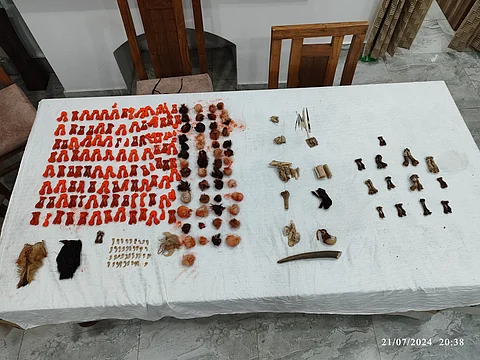

Indian authorities have arrested six individuals from Jharkhand for their alleged involvement in the illegal online trade of wildlife parts, including a substance known as Hatha Jodi. Masqueraded as a rare and powerful charm, it was being falsely advertised as a plant root with mystical properties on prominent e-commerce platforms like Flipkart. However, Hatha Jodi is, in fact, the illicitly obtained genitals of monitor lizards, a species protected by law.
Hatha Jodi is a hemipenis of the monitor lizard (Varanus spp), which is protected under Schedule I of the Wild Life (Protection) Act of 1972. The bifurcated genitals resemble joined hands, leading to its name. Marketed as a “sacred root,” it is touted as a powerful charm by occult practitioners and openly sold on prominent e-commerce websites.
Endangered species, such as tigers, black bucks, snow leopards and monitor lizards, are listed in Schedule I and require the most protection. Hunting or trading in any part of these animals can result in imprisonment for three to seven years and a minimum fine of Rs 25,000.
The alleged wildlife trafficker had listed Hatha Jodi as a decorative item made of wood on the e-commerce website. However, a spotter network from the Wildlife Trust of India (WTI) identified the listing and tracked the advertisement.
Illegal wildlife trade is directly related to biodiversity loss across the world, pushing various species towards the brink of extinction and damaging ecosystems.
Jose Louies, chief executive of WTI, said the image of the Hatha Jodi appeared authentic and the seller also mentored the price, offering delivery across India in a week’s time. “The team decided to pursue the lead but could only learn that a company named KTM Group had published the listing with no additional details regarding the seller,” he said.
The information was then shared with the Wildlife Crime Control Bureau (WCCB) for further investigation. After in-depth digital analysis and going undercover, the team ordered the item on the website which got delivered within a week. The analysis of the product revealed that it was the original animal part and sourced from Jharkhand. Further investigations revealed the items were also allegedly listed on another e-commerce platform, Amazon.
The intelligence was shared with the authorities concerned and Jharkhand forest department, who formed a monitoring team to collect more evidence on the culprit.
“A member from the WTI team code-named ‘SMK’ then quietly established contact with the seller and negotiated another deal for the product. The seller was reluctant in the beginning, knowing it was an illegal product. But eventually agreed to sell Hatha Jodi and other items,” Louies said.
He added that a video was also shared by the seller to confirm the authenticity of the product. Acting on the information, on July 21, 2024, Jharkhand forest department along with WTI raided a shop owned by the seller in Chas, Bokaro and arrested him red-handed with the products.
Other products found were sea fan corals and other illegal items. After the first raid, multiple raids followed in five other locations and additional seizures were made of 120 Hatha Jodis and six persons were arrested. “Each Hatha Jodi is sourced by killing a male monitor lizard, meaning at least 120 monitor lizards were killed,” Louies said.
Attached officer, forest department, Bokaro, Sandeep Shinde stated that unverified elephant and golden jackal bones were seized as well. Other seized items included porcupine needles, wild animal skins and animal parts. “We have sent the samples for forensic analysis to the Wildlife Institute of India for further identification,” he added.
Shinde said the raids were conducted from pooja shops in the area and the suspects were selling the items offline as well. “Interrogation revealed that the suspects were not aware of the gravity of their crime. This is probably the reason they fearlessly listed the items for sale on e-commerce websites,” he told Down To Earth.
He added that it is the first such action against illegal wildlife trade in the region and for now the nexus of the trade stands dismantled.
After issuing directives by the WCCB, Flipkart and Amazon removed the seller’s listing on their websites.
According to Shinde, the demand for illegal wildlife parts is fuelled by people's superstitious beliefs that they can solve financial problems with black magic or health issues with these animals’ medicinal value. “These are all false beliefs. Hence, the department plans to start an awareness drive for the same,” he said.
He added false advertisements on social media platforms are emerging as a new challenge in fighting the illegal wildlife trade.
Louies said that, apart from conventional markets, new trade channels such as cyberspace, which are unregulated, pose new challenges to identifying and preventing wildlife crimes.
“Such platforms fuel a thriving illegal market for endangered animals. Privacy protection features such as encrypted chat and private social media groups further add challenges to tracing the illegal wildlife trade,” he added.